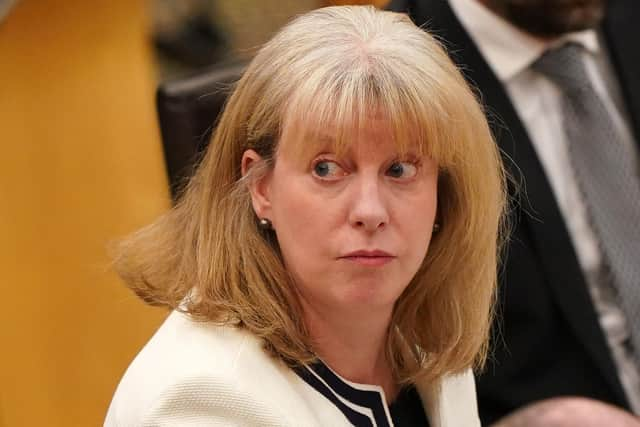Scottish Budget: High earners in Scotland to pay £3,000 more in tax than elsewhere in UK
Higher earners in Scotland are to be hit with a new income tax band in a bid to plug a £1.5 billion black hole.
Finance secretary Shona Robison has confirmed in the Scottish Budget that those earning between £75,000 and £125,140 a year will be hit with a 45 per cent levy.
Advertisement
Hide AdAdvertisement
Hide AdThis new tax band means anyone earning around £100,000 will be about £3,500 worse off than someone on the same salary in England.


She also increased the top rate of tax for those earning over £125,140 from 47 per cent to 48 per cent, and the current thresholds for the higher and top bands (£43,663 and £125,140 respectively) would be frozen instead of rising in line with inflation.
Ms Robison says this will generate an extra £307m as more people will find themselves in higher tax bands after being given pay rises.
The new income tax band was originally suggested to the Scottish Government by the Scottish Trades Union Congress, which claimed the move could raise around £92 million.
However, economic experts at the Fraser of Allander Institute say the new income tax band will lead to people changing their behaviour to limit how much tax they pay, so it will only raise around £39m.
Those hit with the new income tax band are currently part of the “higher rate” tax band, which is those earning between £43,663 and £125,140.
Anyone in this tax band but not affected by the new tax band – those earning between £43,663 and £74,999 – will not be impacted and will continue to pay 42 per cent income tax.
Scotland is already the most taxed part of the UK, and anyone earning around £28,000 in Scotland already pays more income tax than if they lived in England.
Advertisement
Hide AdAdvertisement
Hide AdOn Monday Prime Minister Rishi Sunak warned the Scottish Government against raising taxes during the cost-of-living crisis, saying it would harm hard-working families.
During a visit to RAF Lossiemouth, he said: “Scotland is already the highest taxed part of the UK. Both the [UK Government’s national insurance cut and small business discount] will benefit Scotland families, will benefit Scottish businesses.
“They’re a demonstration of the UK Government’s approach to driving growth and easing the cost-of-living and, increasingly, the SNP government is taking a different approach and it’s ultimately up to them to explain that to people here in Scotland.
“I don’t think it’s the right approach because I think we should be cutting taxes, not raising them.”
The introduction of a new income tax band means Scotland now has six income tax bands, while the rest of the UK has just three.
Comments
Want to join the conversation? Please or to comment on this article.